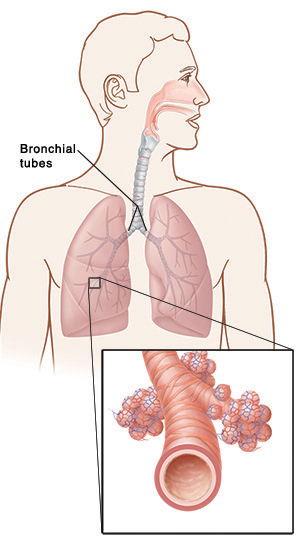You have a viral upper respiratory illness (also called an upper respiratory infection, or URI), which is another term for the common cold. When the viral infection causes a lot of irritation, the air passages can spasm, which may cause coughing, wheezing, and shortness of breath.
This viral illness is contagious during the first few days. It's spread through the air by coughing and sneezing. It may also be spread by direct contact, such as by touching the sick person and then touching your own eyes, nose, or mouth. Frequent handwashing will help lower the risk.
Most viral illnesses go away within 7 to 10 days with rest and simple self-care. Sometimes the illness may last for several weeks. Antibiotics will not kill a virus, and they are generally not prescribed for this condition.
Home care
-
If symptoms are severe, rest at home for the first 2 to 3 days or as directed. When you resume activity, don't let yourself get too tired.
-
If you smoke, stop. Ask your health care provider if you need help.
-
Stay away from secondhand cigarette smoke. Don't let people smoke in your house or car.
-
You may use acetaminophen or ibuprofen to control pain and fever, unless another medicine was prescribed. Take the medicine only as directed on the label. Talk with your provider before using these medicines if you have chronic liver or kidney disease, have ever had a stomach ulcer or digestive bleeding, or are taking blood thinners. Never give aspirin to anyone under 18 years of age who is ill with a viral infection or fever. It may cause severe liver or brain damage, or even death.
-
Your appetite may be poor, so a light diet is fine. Stay well hydrated by drinking 6 to 8 glasses of fluids per day (water, soft drinks, juices, tea, or soup). Extra fluids will help loosen secretions in the nose and lungs.
-
Over-the-counter cold medicines will not shorten the length of time you’re sick, but they may be helpful for the following symptoms: cough, sore throat, and nasal and sinus congestion. Ask your provider or pharmacist which over-the-counter medicine to use. Don't use decongestants if you have high blood pressure unless your provider tells you that it's okay.
-
You may be prescribed a bronchodilator medicine to help with breathing and improve the wheezing. It may come as a pill, an inhaler, or as a liquid to use in a nebulizing machine. The machine turns the medicine into a mist to breathe in. Follow all instructions for using these medicines. It's important to always use the correct technique when taking bronchodilators.
Follow-up care
Follow up with your health care provider, or as advised.
When to get medical advice
Contact your health care provider right away if any of these occur:
-
Cough with lots of colored mucus
-
Breathing problems don't get better in 2 to 3 days
-
Severe headache; face, neck, or ear pain
-
Difficulty swallowing due to throat pain
-
Fever of 100.4ºF (38ºC) or higher, or as directed by your provider
Call 911
Call
-
Chest pain or chest tightness
-
Worsening shortness of breath, wheezing, or difficulty breathing
-
Coughing up blood
-
Feeling of doom
-
Feeling faint or dizzy
-
Lips or skin is blue, purple, or gray in color
-
Unable to talk
-
Very severe pain when swallowing, especially if it goes along with a muffled voice


